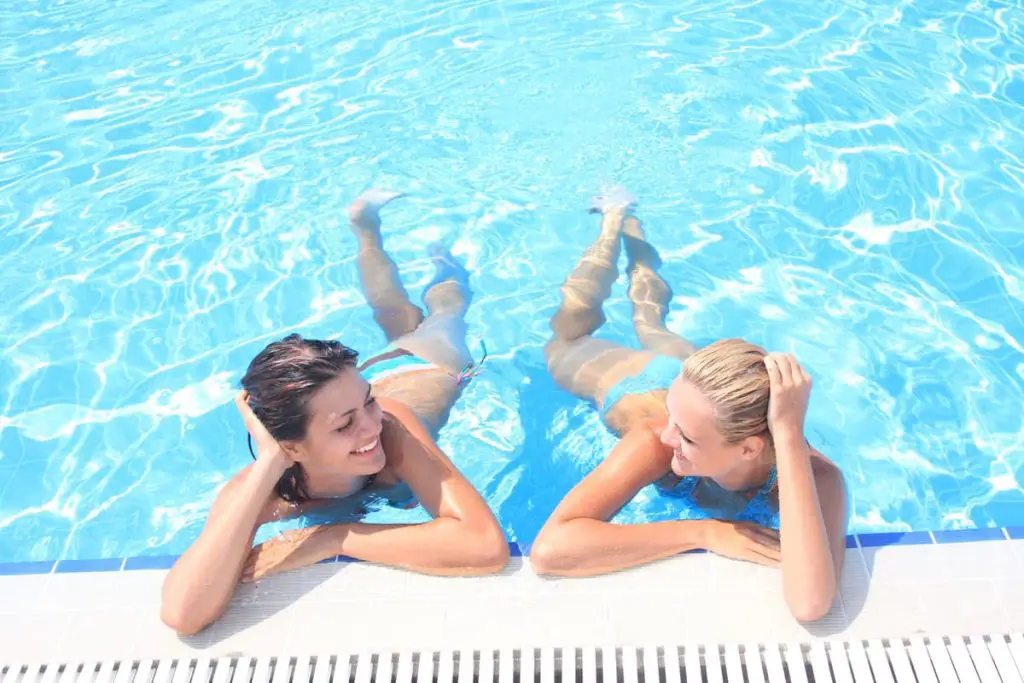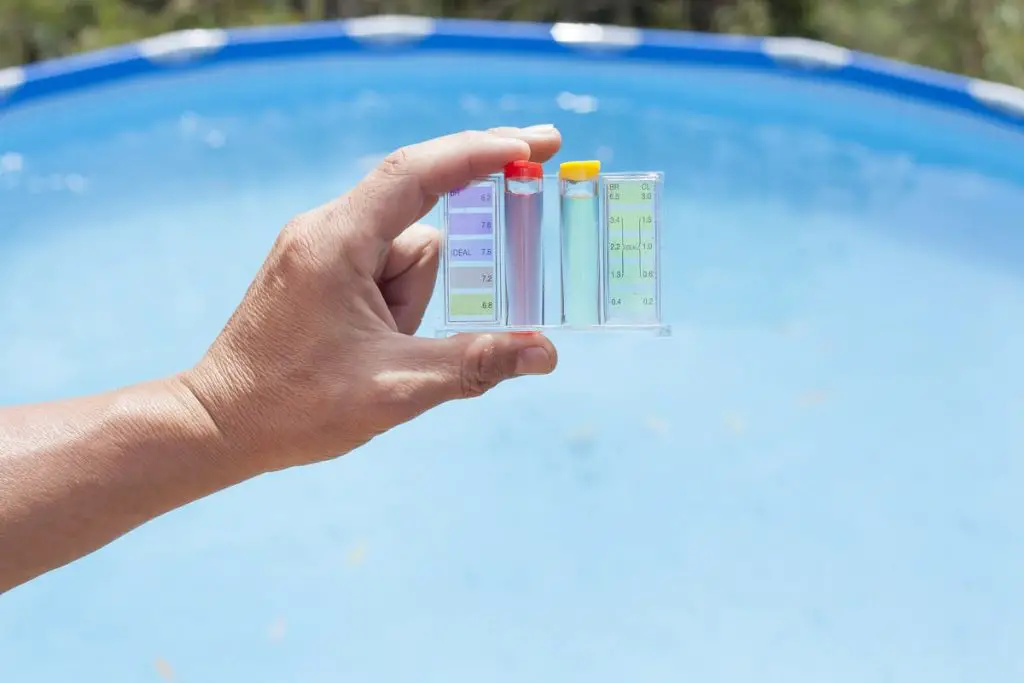When summer comes around, swimming can become an almost daily activity. Chlorine has been used extensively for many years and can lead to unexpected outcomes with prolonged exposure. For example, can chlorine bleach hair?
Chlorine can bleach hair, but not as quickly or dramatically as hair bleach will. The lightening of hair pigment becomes more prominent as chlorine exposure increases. Hair that contains chemicals or dye may enhance the chlorine impact.
In addition to lightening pigment, chlorine can significantly affect both the hair and skin. I’ll talk about some of those issues here so that you can manage your risk of exposure accordingly.

What does chlorine do to your hair?
Chlorine can have similar effects compared to bleach, as it can lighten the pigment in hair strands by reacting to the melanin contained in hair strands. The substance is attracted to hair stands’ oils, drawing it out over time. Unfortunately, this can have various additional effects, many of which are not desirable.
Dry and weakened hair strands
Human hair is predominantly keratin, a type of protein, and is coated in sebum, a naturally secreted oil. Sebum would ideally retain moisture and protect hair strands, in addition to various other benefits.
Since chlorine bonds with sebum and draws it out of the hair strands, it can severely damage hair. Hair strands will become dry when exposed to chlorine since they can no longer retain moisture. The hairs’ elasticity will diminish over time, which will lead to progressively worsening breakage and split ends.
Changes hair strand structure
Chlorine may also impair the molecules in the hair by making some of the keratin protein bonds water-soluble, which can cause thinning and weakened hair strands. Hair that has undergone chemical treatments, such as perming, may be more likely to absorb chlorine since it is already porous.
Dull and faded hair
Chlorine sucks pigment out of the hair in various ways, depending on the state of the hair before exposure. Chlorine generally results in hair losing its shine, and color will become dull or faded instead of simply lightening in shade or tone. In some cases, it can cause discoloration, depending on neighboring chemicals and the hair condition.
Hair loss
In severe cases, exposure to chlorine frequently or for prolonged timeframes can have extremely harmful effects on the hair roots and scalp. Some swimming instructors, athletes, and professionals who spend ample time in chlorinated water have even begun losing hair in patches.
How long does it take for chlorine to lighten hair?
It will take prolonged or frequent exposure before chlorine can lighten the hair. Usually, differences in color and shade would only be noticeable after regular chlorine exposure over a few weeks or months – such as spending the entire summer swimming for hours almost daily.
But, some people may see faster results than others. Hair that has been dyed with chemical treatments will lighten much quicker than natural hair since it is easier for chlorine to bond to these molecules. The process will be hastened if your hair has been bleached at some point as well.
Does chlorine bleach skin or make it darker?
Contrary to its effect on hair, chlorine is unlikely to lighten or darken the skin since skin pigment lies deep below the surface layers. Skin lightening has been trending in recent years, and chlorine has been thrown under an unexpected spotlight. New products have even been designed to lighten the skin based on theories, such as chlorine soap.
However, these are dangerous and will not have the desired effect. Chlorine can agitate the skin to various degrees, depending on how sensitive your skin is. Chlorine will suck the natural oils from the skin, leaving it red, irritated, and prone to damage.
Although, the skin may become darker when combined with sunlight since it enhances the likelihood of tanning. Lightening or darkening will likely not result from chlorine exposure itself but instead surrounding circumstances or additional substances in pools. It is certain that chlorine will dry up your skin while diminishing its elasticity, smoothness, and overall health.

Tips to avoid chlorine impacts on hair/skin
If you are concerned about the effects swimming in chlorinated water may have on your hair and skin, rest assured since there are plenty of ways to avoid or reduce damage.
Test the chlorine levels in the water
The first thing you will want to do is make sure you know ahead of time what the chlorine levels are in your pool. I always preach to never get into a pool without knowing the chemical balance. That’s just asking for trouble!
There are two ways that you can easily test your water at home.
- Use Water Test Strips
- Get a Liquid Test Kit
Test strips are quick, convenient, and take the chance of error out of your hands. You simply pull a strip out, dunk it underwater for a few seconds, and then read the results. You can get them pretty easily on Amazon and they are pretty inexpensive.
Liquid Test Kits are a little fancier and can provide you with more information on exactly what is required to resolve an unbalanced pool. I personally picked up the Taylor K-2006 kit shown below.
While these kits may be more expensive than strips, they last a lot longer and allow you to test the water completely.
Hair protection
Before swimming, rinse your hair thoroughly. Filling your hair strands with water molecules will lower their absorbency, which will reduce the amount of chlorine that enters the hair strands. You can also use pre-swim in-hair defense products, oils, or conditioners best applied after rinsing, and this will help protect the outer layer of the hair strands against chlorine damage.
The best way to physically protect your hair from chlorine is to wear a waterproof swimming cap before entering chlorinated water. The cap will cover approximately 95% of your hair and scalp. Thankfully, swimming caps have plenty of additional benefits, such as improving agility and speed underwater. They are also relatively inexpensive. Here are a few you can pick up on Amazon:
Always rinse your hair properly after chlorine exposure, regardless of what protective measures you take. You can always shampoo your hair at a later stage, but getting the remaining chlorine out of your hair as soon as possible will lower the risks of severe damage. Try using shampoo versions that target the removal of harsh chemicals after exposure or DIY approaches like apple cider vinegar rinses.
Skin protection
Skin is harder to protect since its porosity cannot be manipulated as easily as hair strands. Moisturizing is the most important factor when exposing your skin to chlorine. Always make sure your use effective shower gels and body washes immediately after chlorine exposure, as it should not be left to dry and set in on your skin.
Body oils and advanced repair moisturizers are fantastic for replenishing skin cells’ hydration. Applying a generous amount of moisturizer and sunscreen before swimming can also help repel water and prevent chlorine-related skin damage.
Conclusion
Although chlorine can bleach hair, the rate of change is much slower than with hair products. Prolonged exposure poses various risks, and you should always take care to provide additional moisture and nourishment to your hair and skin when swimming in chlorinated water.
Sources
Underwater Audio: Effects of chlorine on human hair
Hair Pros: Chlorine and Hair: How to Prevent Damage
Swim4Life: The Effects of Pool Water on Hair
Coconuts Bangkok: Whitening Craze as Chlorine Soap Hits Market
